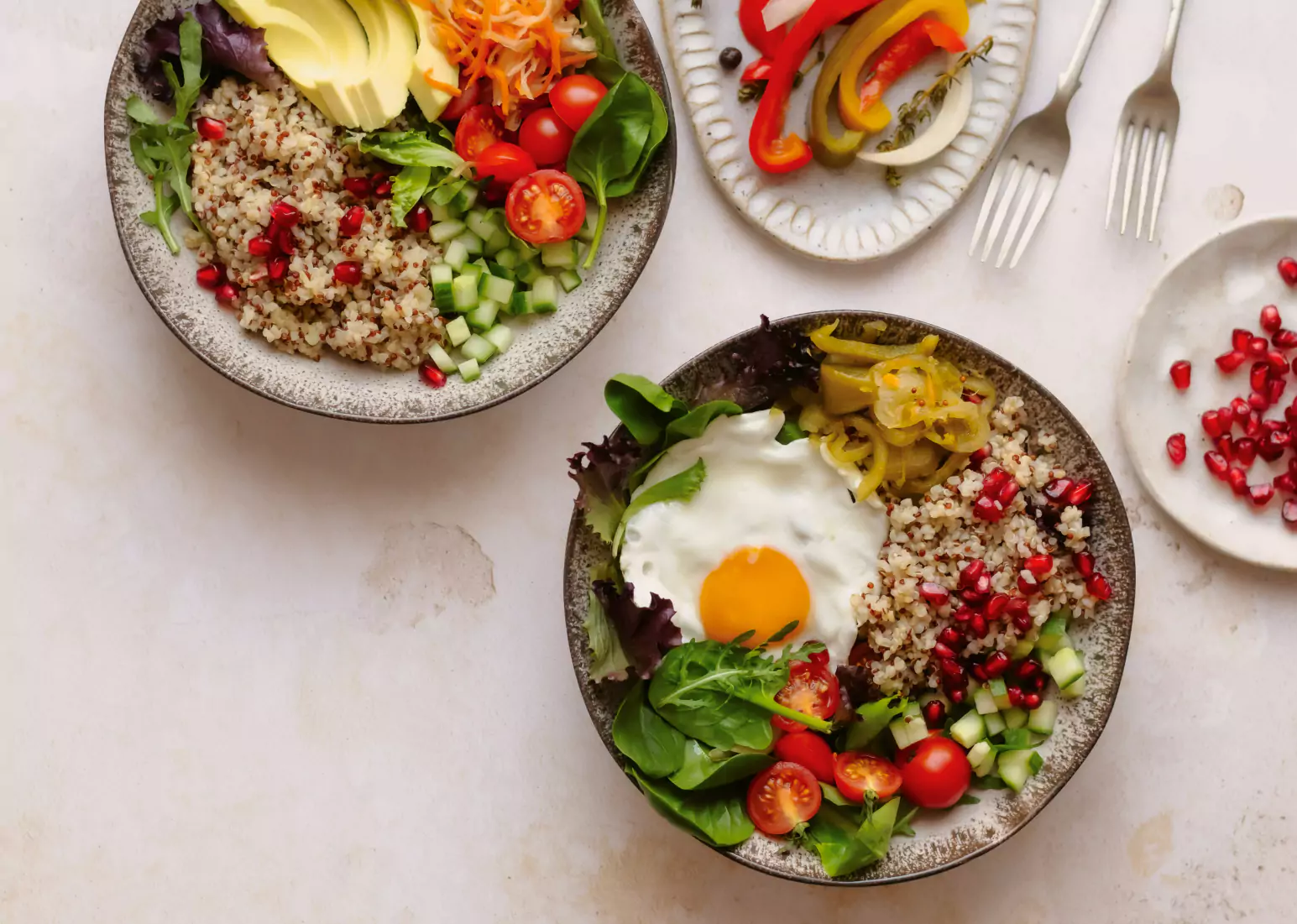What to Eat When You Have PCOS: A Guide to Healthy Eating for PCOS

Key Takeaways
Polycystic ovary syndrome, or PCOS, is a condition that affects as many as up to six million women of reproductive age in the U.S. alone. While its exact cause is unknown, there are a few factors that may influence the development of PCOS.
The symptoms of PCOS can vary from case to case, however, most women are diagnosed after experiencing irregular periods, symptoms of excess androgen levels, and/or the presence of fluid-filled follicles, or cysts, in the ovaries.
Luckily, there are many lifestyle changes that may make it easier to manage these symptoms. If you’re someone suffering with this condition, making dietary changes may be one way to help alleviate your symptoms. Let’s take a closer look at some of the evidence-backed ways to manage your PCOS through your diet.
What is a PCOS Diet?
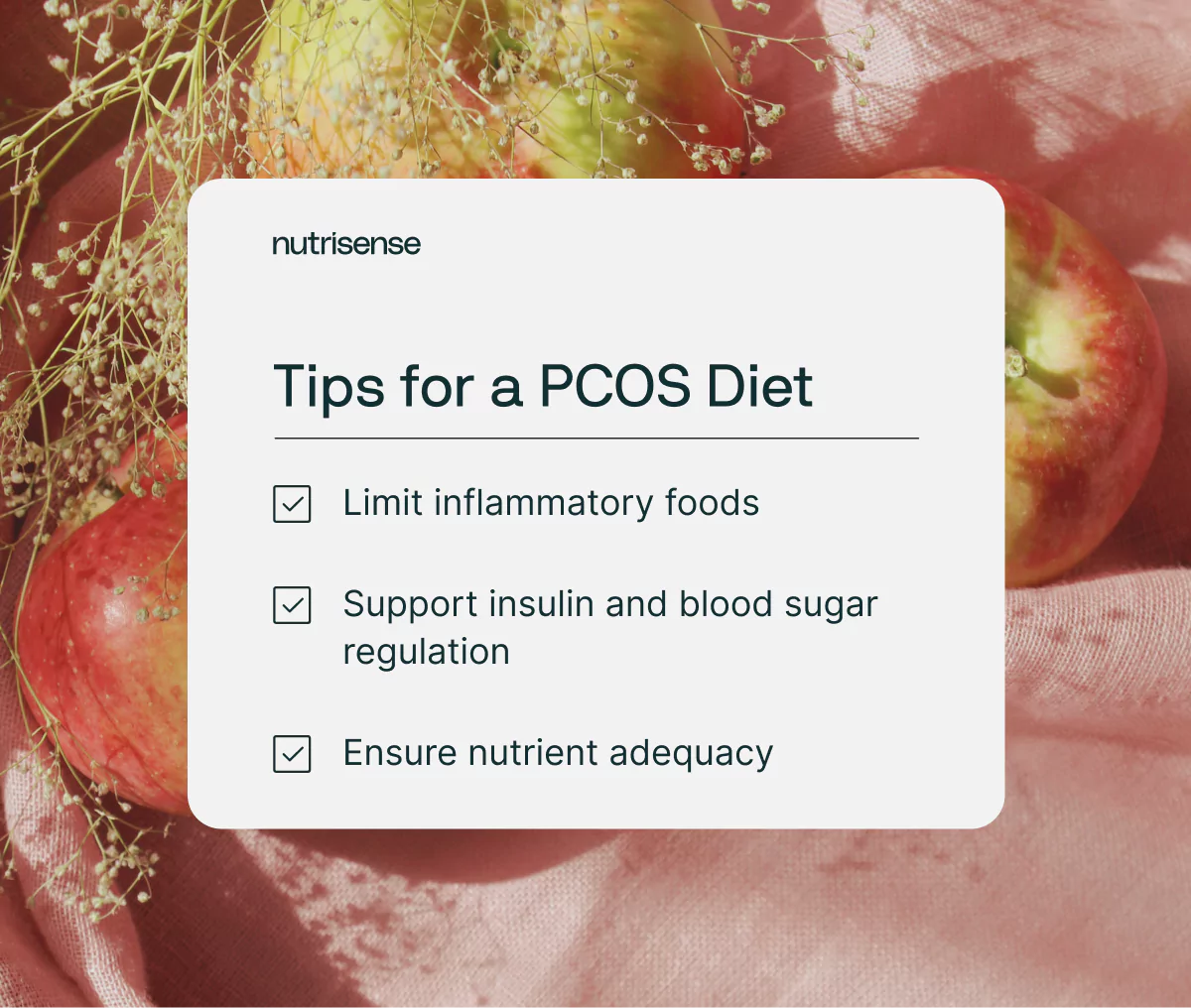
There is no diet that will “cure” PCOS, but there are certain dietary patterns that may improve your symptoms. Ideally, a PCOS diet will limit inflammatory foods, ensure nutrient adequacy, and support insulin and blood sugar regulation to help manage your symptoms.
However, it’s important to keep in mind that before implementing any dietary changes, you should discuss your condition with your doctor and a qualified nutritionist. Inflammatory foods may also be highly individualized and dependent on unique responses to foods.
Why a PCOS Diet Can Be Helpful
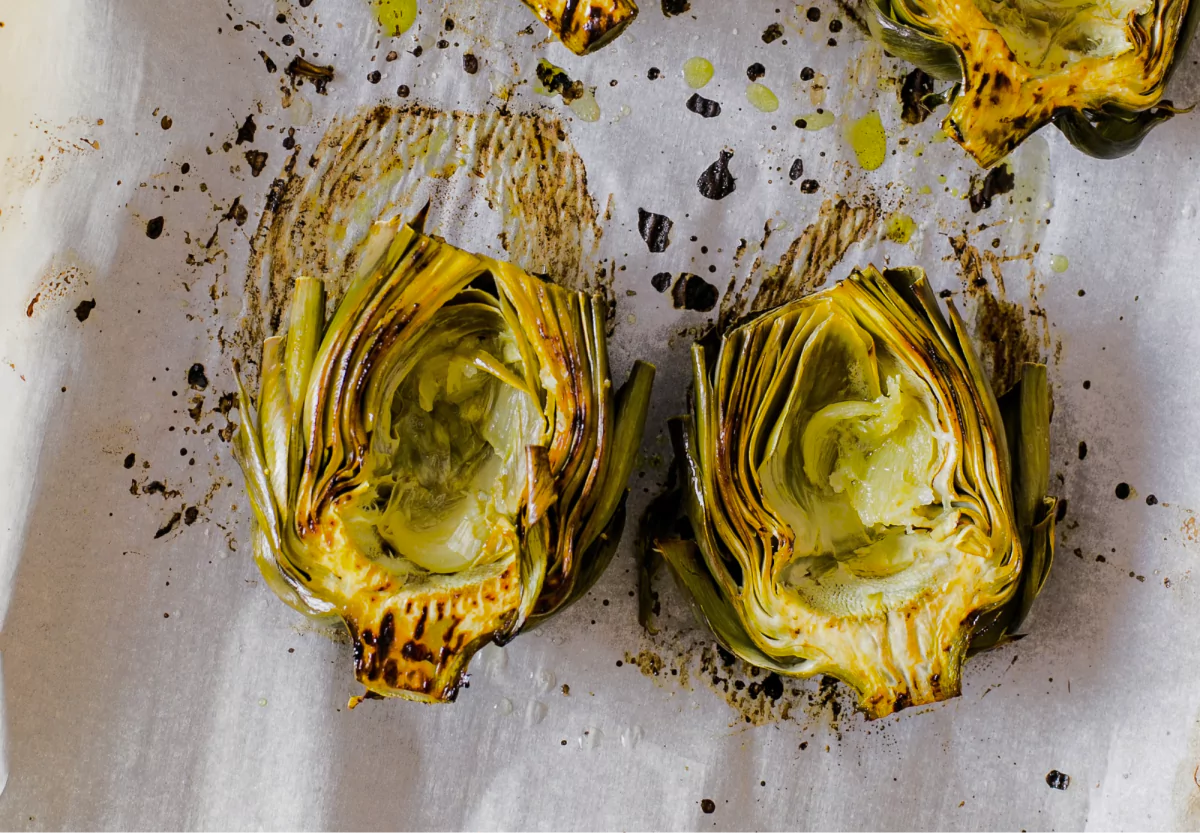
Research suggests that your diet is one of the biggest environmental determinants of developing PCOS. This may be because conditions such as chronic inflammation, obesity, and high insulin levels - which are all risk factors of PCOS - can be heavily influenced by your diet.
Studies show that obesity and inflammation can aggravate the symptoms of PCOS. High levels of insulin, which can result from your diet, are also a major factor in PCOS.
This condition can also significantly increase your risk of metabolic syndrome and cardiovascular diseases. Currently, there is no standard diet recommended for PCOS. However, taking steps to support weight loss and stabilize insulin levels through a healthy eating plan and a balanced diet in addition to avoiding foods that cause inflammation is a great place to start.
PCOS and Blood Glucose
Polycystic ovarian syndrome and blood glucose levels are closely linked. Insulin resistance, which affects 50-70 percent of women with PCOS, occurs when your body no longer responds appropriately to the hormone insulin.
When blood sugar levels rise in your bloodstream, your pancreas pumps out insulin to help your cells absorb glucose from the blood. When you have insulin resistance, your body has more trouble regulating blood glucose levels and glucose levels may remain higher.
Insulin resistance can lead to the development of chronic health conditions like type 2 diabetes. In fact, more than half of women with PCOS develop type 2 diabetes by age 40.
The Best Foods to Eat on a PCOS Diet
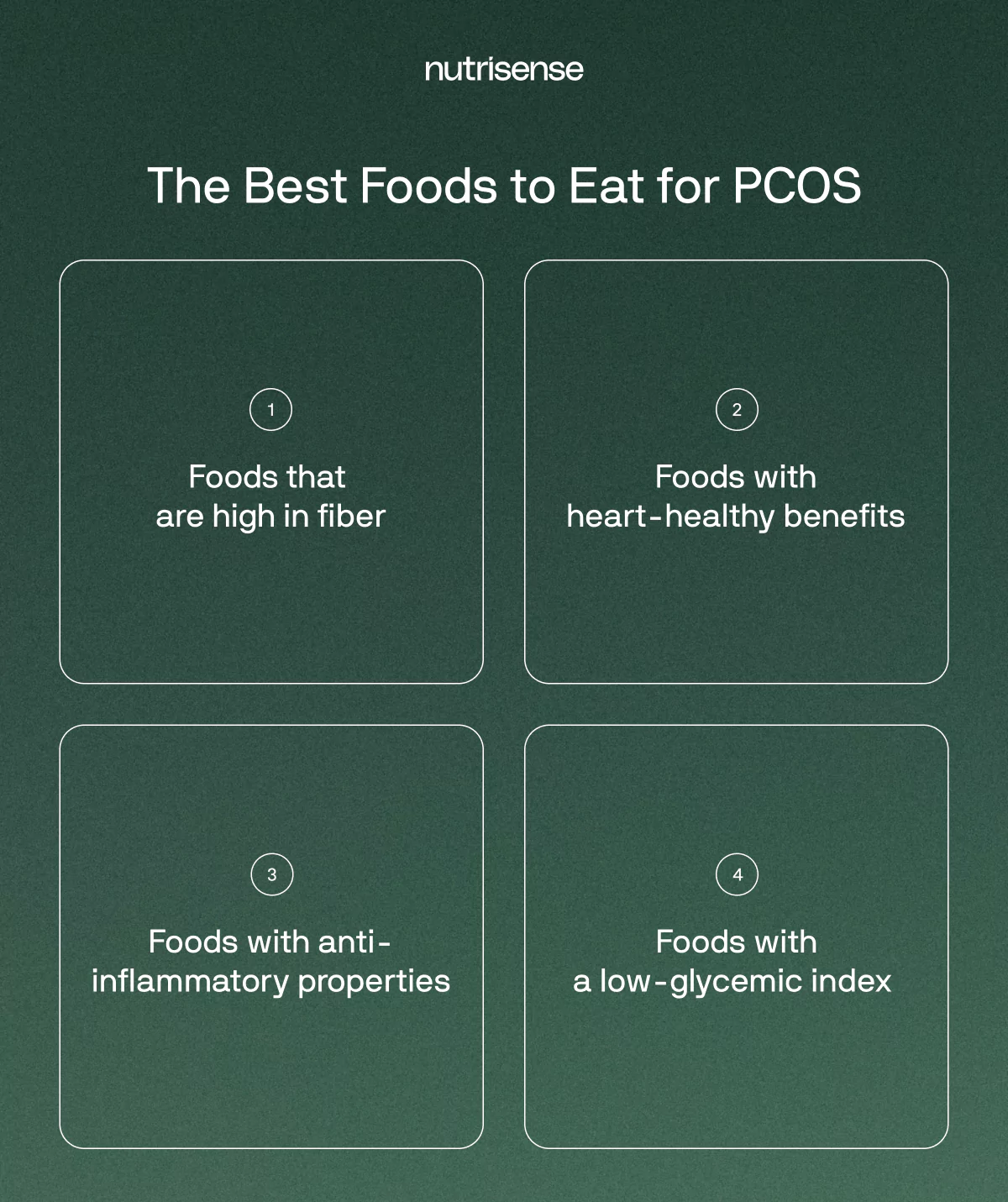
As we mentioned earlier, the best foods to eat on a PCOS diet should include foods that can support healthy hormone levels and blood sugar regulation. These can include foods that:
- Are high in fiber
- Possess heart-healthy benefits
- Contain anti-inflammatory properties
- Considered low-glycemic index foods
Let’s take a look at some of the best kinds of foods to eat on a PCOS-friendly diet.
High-Fiber Foods
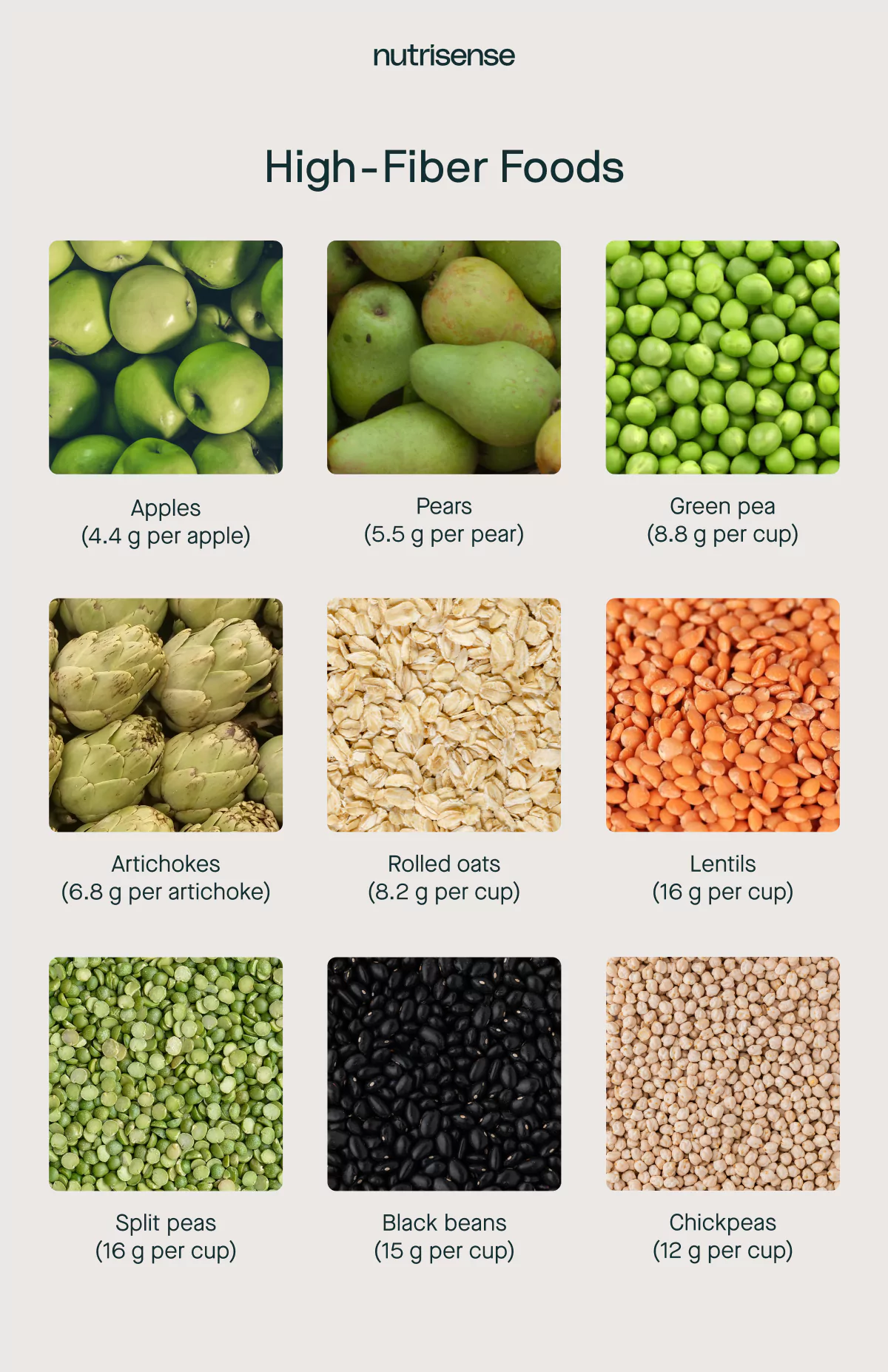
Foods high in fiber have lots of health benefits, but a high-fiber diet may also be particularly beneficial for people with PCOS. Fiber has been shown to improve blood sugar regulation and support cardiovascular health, and is found in foods like:
- Fruits like citrus and berries
- Beans and legumes like lentils, chickpeas
- Non-starchy veggies like leafy greens
- Whole grains such as brown rice and quinoa
Even though fiber is technically a carbohydrate, it can’t be digested by the body, so it does not cause a spike in blood sugar. A diet adequate in fiber may also help reduce your insulin levels.
The daily recommended fiber intake for women is 21-25 grams per day, while the recommended intake for men is 30-38 grams per day. Plant foods like vegetables, fruits, whole grains, and legumes are all good sources of fiber.
Foods for Heart Health
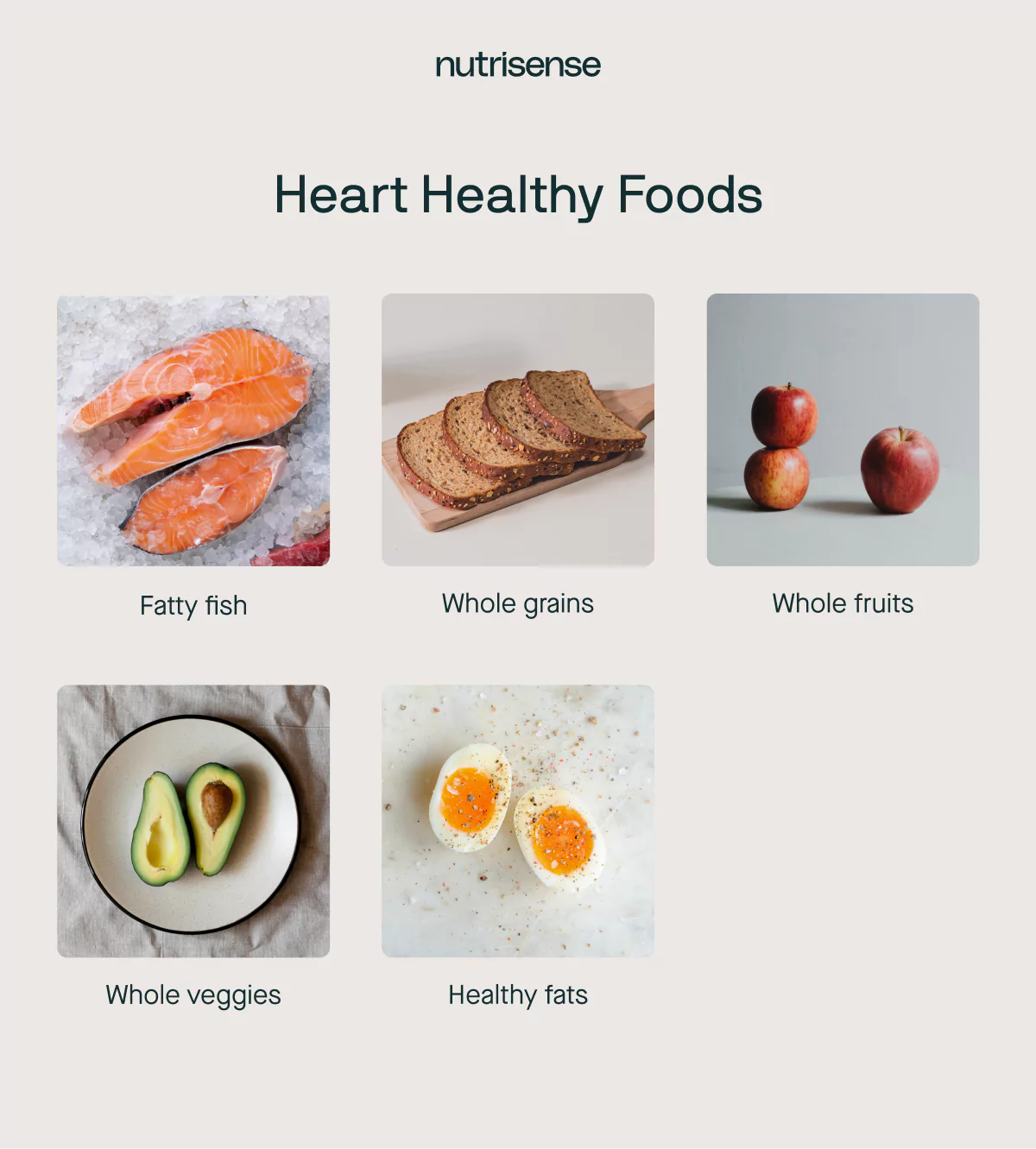
People with PCOS are at higher risk for developing cardiovascular disease, so a diet rich in heart-healthy foods could be critical for people with PCOS. Foods that may benefit heart health include extra virgin olive oil, fatty fish, whole grains, and monounsaturated fats found in avocados, some seeds and nuts.
Olive Oil
Olive oil has been shown to benefit cardiovascular health. Olive oil may also reduce your risk of type 2 diabetes, which people with PCOS are at higher risk for.
Fatty Fish
Fatty fish like salmon, tuna, sardines, and trout are high in omega-3 fatty acids. These foods can all have a positive effect on heart health, and, can increase antioxidant activity in the body.
Whole Grains
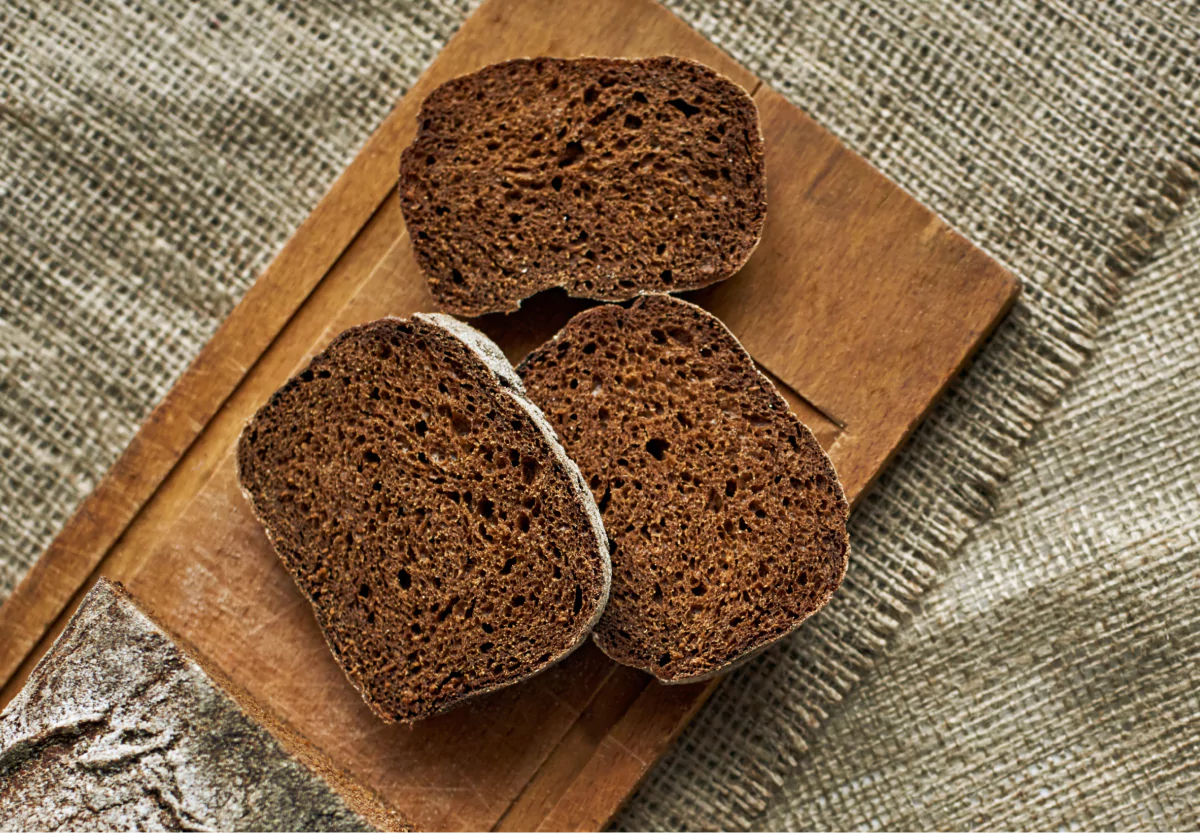
Whole grains, unlike refined grains, contain the entire wheat grain, including the bran, germ, and endosperm. Because whole grains are high in fiber, they have a positive effect on cholesterol levels and can lower your risk of cardiovascular disease.
Oats, barley, quinoa, whole wheat, and brown rice are all examples of whole grains you can try adding to your diet to reap these benefits. If you are sensitive to gluten, you might want to stick to the gluten-free whole grain options such as brown rice, oats, quinoa, and buckwheat.
Monounsaturated and Polyunsaturated Fats
The Academy of Nutrition and Dietetics advises that the majority of healthy fats in a heart-healthy diet come from monounsaturated or polyunsaturated fats. Both types of fat may help reduce bad cholesterol levels, lowering your risk of heart disease.
However, monounsaturated fats may be particularly beneficial. Avocados, olive oil, and certain seeds and nuts are all high in monounsaturated fats.
Anti-Inflammatory Foods
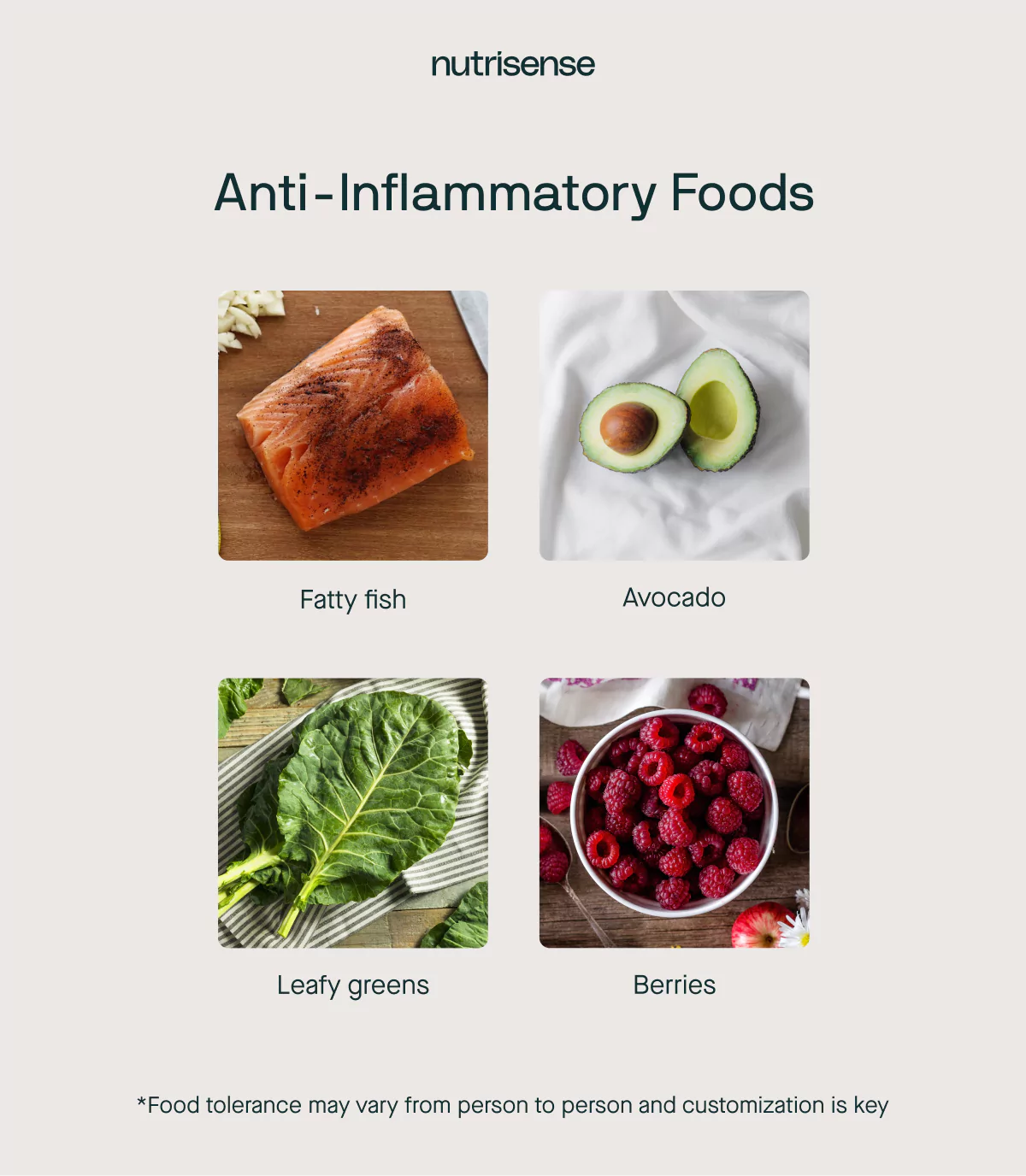
Chronic inflammation is a key component of PCOS. Certain foods, like added sugar, can cause inflammation in the body of those with PCOS. This inflammation also can stimulate androgen production and contribute to insulin resistance, two other key components of PCOS.
An anti-inflammatory diet may help regulate hormones in people with PCOS, while also decreasing your risk of cardiovascular problems. Foods rich in antioxidants may be supportive. Vitamin C, vitamin E, carotenoids, flavonoids, tannins, phenols are all examples of antioxidants.
Brent Bauer, M.D., General Internal Medicine at the Mayo Clinic echoes a good guideline here: “Whole foods are generally a better source of vitamins than supplements.”
Some food sources of antioxidants include:
- Vitamin C: fresh leafy greens, citrus, and fresh bell pepper
- Vitamin E: sunflower seeds, avocado
- Selenium: protein-rich foods and Brazil nuts
- Phytonutrients such as flavonoids: many colorful fruits and veggies as well as some herbs and spices
Low-Glycemic Index Foods
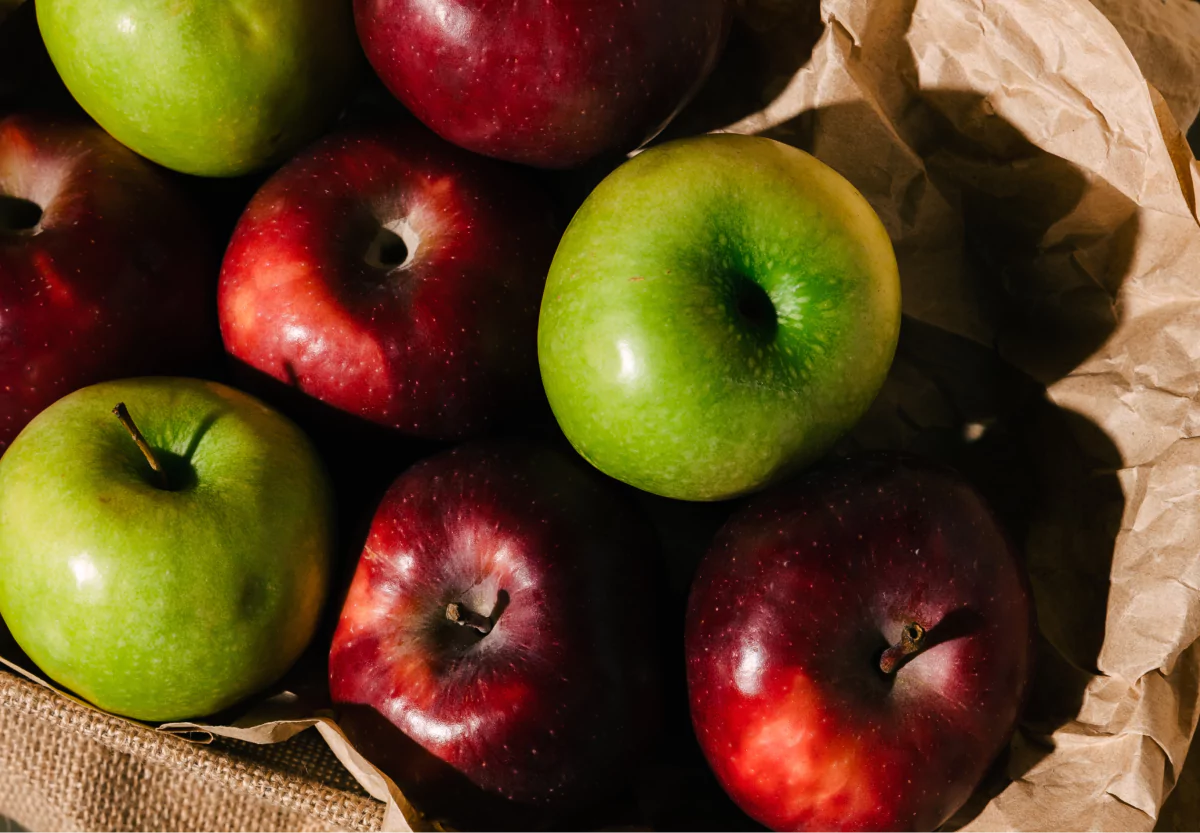
The glycemic index, or GI, system was developed as a tool for people with diabetes to make healthy food choices. A food with a low-GI is less likely to increase blood sugar. Of course, it also depends on the amount you eat, which is reflected by the glycemic load (GL) of a food.
Studies have found that a low-GI diet may benefit menstrual regularity in people with PCOS as well as improving insulin sensitivity and lowering cholesterol.
However, the GI scale is just one tool you can use to manage your blood sugar. It’s important to always consider the nutritional content of foods as well. Nutrient-dense, low-glycemic index foods include foods like green vegetables, legumes, lean protein sources, some fruits, whole grains, nuts, and olive oil.
Foods to Avoid If You Have PCOS
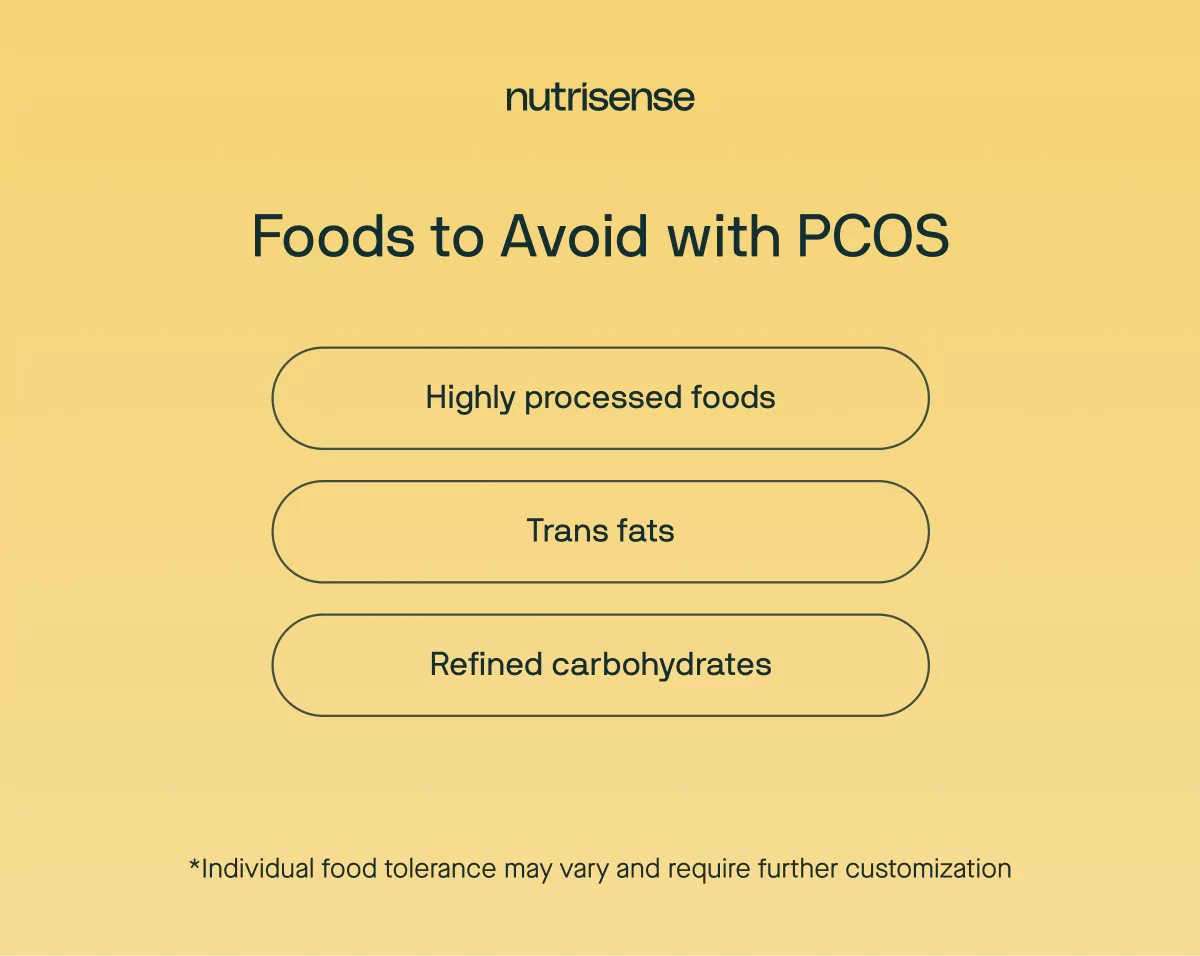
Because of the strong link that nutrition can have with PCOS, knowing what foods not to eat with PCOS may be helpful. This is because certain foods may contribute to or worsen conditions such as inflammation, insulin resistance, and heart disease.
Foods you may want to limit or avoid to help with PCOS symptoms include:
Ultra-Processed Foods
Many processed foods tend to be higher in refined starches and sugars and trans fats, which can contribute to health conditions like prediabetes or diabetes, chronic inflammation, and heart disease—all of which can exacerbate PCOS symptoms.
If you have PCOS, it may be beneficial to create a diet plan that limits processed foods and drinks, and reach for whole foods such as protein, vegetables, whole grains, and beverages with no added sugars instead.
AGEs
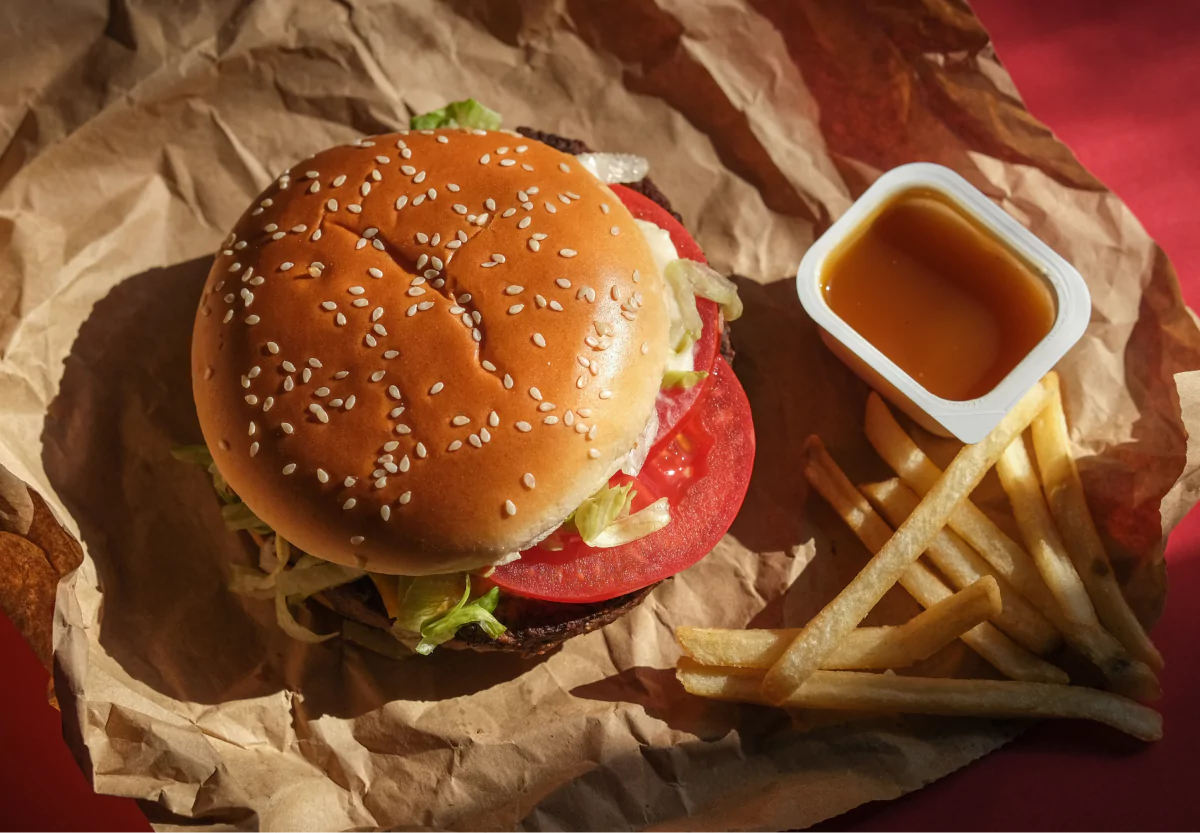
Advanced glycation end products, or AGEs, are molecules that are formed when sugars in the bloodstream react with proteins or fats. These molecules can be formed when foods that are high in protein come in contact with high heat during cooking, and are associated with many health problems, including inflammation and diabetes.
Your body can usually eliminate these harmful compounds, but eating too many of them can affect your body’s ability to do so. High AGE levels can exacerbate the symptoms of PCOS, so you may want to limit foods that are high in AGEs.
Animal products like meat cooked or charred at high temperatures may contain more AGEs. Nuts like almonds and cashews, butter, some cheeses, and full-fat dairy products can also be high in AGEs.
Trans Fats
Trans fats have been linked to increased risk of heart disease and type 2 diabetes. Foods high in these fats include commercial baked goods (like cakes, cookies, and pies), shortening, microwave popcorn, frozen pizza, fried foods, and margarine.
Refined Carbohydrates
A diet high in refined carbohydrates can have negative effects on your health, including and increased risk of insulin resistance, heart disease, and inflammation. Foods high in refined carbs include soda, energy drinks, desserts, white bread, many breakfast cereals, and white rice.
Find the right Nutrisense programto turn insight into progress.
Go Beyond Glucose Data with Nutrisense
Your glucose can significantly impact how your body feels and functions. That’s why stable levels are an important factor in supporting overall wellbeing. But viewing glucose isn't enough. Nutrisense, you’ll be able to learn how to use your body's data to make informed lifestyle choices that support healthy living.
One-to-one coaching
Sign up to access insurance-covered video calls to work with a glucose expert: a personal registered dietitian or certified nutritionist who will help tailor your lifestyle and diet to your goals.
Monitor and measure what matters
With the Nutrisense CGM Program, you can monitor your glucose with health tech like glucose biosensors and continuous glucose monitor (CGM)s, and analyze the trends over time with the Nutrisense App. This will help you make the most informed choices about the foods you consume and their impact on your health.
Find your best fit
Ready to take the first step? Start with our quiz to find the right Nutrisense program to help you take control.

Heather is a Registered and Licensed Dietitian Nutritionist (RDN, LDN), subject matter expert, and technical writer, with a master's degree in nutrition science from Bastyr University. She has a specialty in neuroendocrinology and has been working in the field of nutrition—including nutrition research, education, medical writing, and clinical integrative and functional nutrition—for over 15 years.


